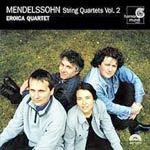
String Quartets Vol 2
 $41.00
Out of Stock
$41.00
Out of Stock6+ weeks add to cart
MENDELSSOHN
String Quartets Vol 2
Eroica Quartet
[ Harmonia Mundi / CD ]
Release Date: Saturday 25 May 2002
This item is currently out of stock. It may take 6 or more weeks to obtain from when you place your order as this is a specialist product.
"Ravishing playing"- Classic CD
Leading the revival of Romantic period-performance style, The Eroica Quartet presents the second installment of its highly acclaimed Mendelssohn cycle with which the group made its harmonia mundi début.
"Ravishing playing"- Classic CD, [4 stars]
"Superb" - The Sunday Times, London
As the French Revolution stunned political Europe, so the revolutionary sounds of Beethoven astonished the world of music. The artist, no longer under the auspices of a wealthy patron, was liberated as an individual creative soul. Emerging from these turbulent times, the music of Beethoven and Schubert became the inspiration for Mendelssohn, Schumann, Brahms and their successors.
The Eroica Quartet has astonished audiences with its radical interpretations of some of the best-known music of the nineteenth century. The Quartet was formed in 1993 by four of Britain's leading period instrumentalists, committed to performing music of the Romantic period and to rediscovering the style of its performance. They passionately believe that greater freedom of expression can be found in a thorough immersion in the performance styles of the past. The group aims to bring new perspectives to a familiar repertoire, and to re-introduce forgotten masterpieces.
The Quartet has played for many UK organisations, and appeared on an Open University music study video, rehearsing and performing. In 1997 they gave a series of six concerts for the City of London Festival, performing the op.18 quartets as part of a complete Beethoven cycle, and in the autumn of that year gave three concerts at the Nuits Romantiques festival in and around Aix-les-Bains in France. Last year the Quartet gave concerts for Early Music Wales, at the universities of Lancaster, Sheffield and Cardiff, and at the Amersham Festival.
The Quartet has a strong and enquiring relationship with Dr.Clive Brown, a leading expert in the field. In particular they have worked together on the expressive implications of bowings and fingerings found in mid-nineteenth-century editions. One of the most influential interpreters of the time was Mendelssohn's friend, the leader of the Leipzig Gewandhaus Orchestra, Ferdinand David. For their recent recording of Mendelssohn quartets the Eroica Quartet has had access to a signed 1st violin part containing his unpublished bowings and fingerings. They have studied extensively many old editions and from these have developed their own style of performance.
Three members of the Quartet appear as principal players in John Eliot Gardiner's orchestra. They were involved in his much acclaimed Beethoven symphony cycle, and have also recorded Schumann's entire orchestral works.
Tracks:
Quartet No. 3 in D Major, Op. 44, No. 1
Quartet No. 4 in E Minor, Op. 44, No. 2
